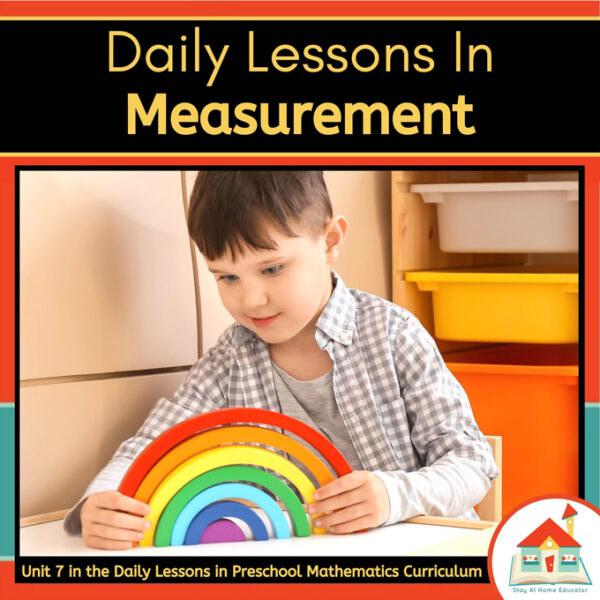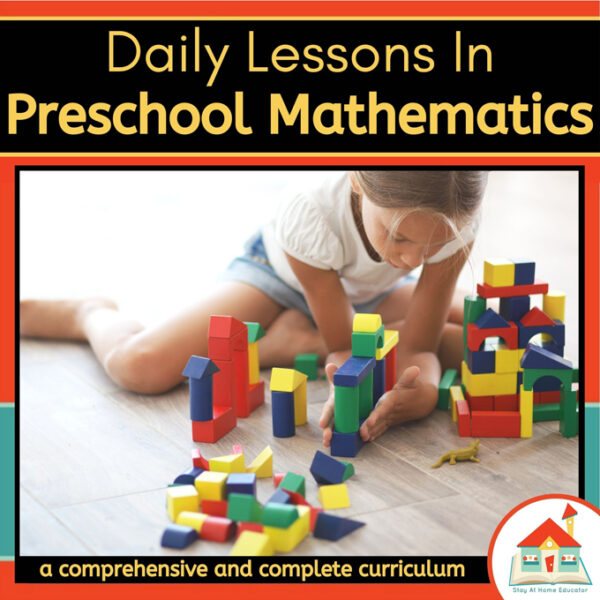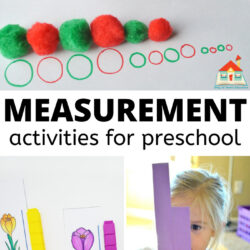Here are all the measurement activities for preschoolers you’ll ever need! You can consider it your ultimate guide to teaching measurement in preschool. We have included the what, the why, and the how to prepare your early learners to be successful in all things measurement. With this guide, you will come away feeling confident and with new fun ways to teach measurement in preschool.
What You Need to Know About Teaching Measurement to Preschoolers
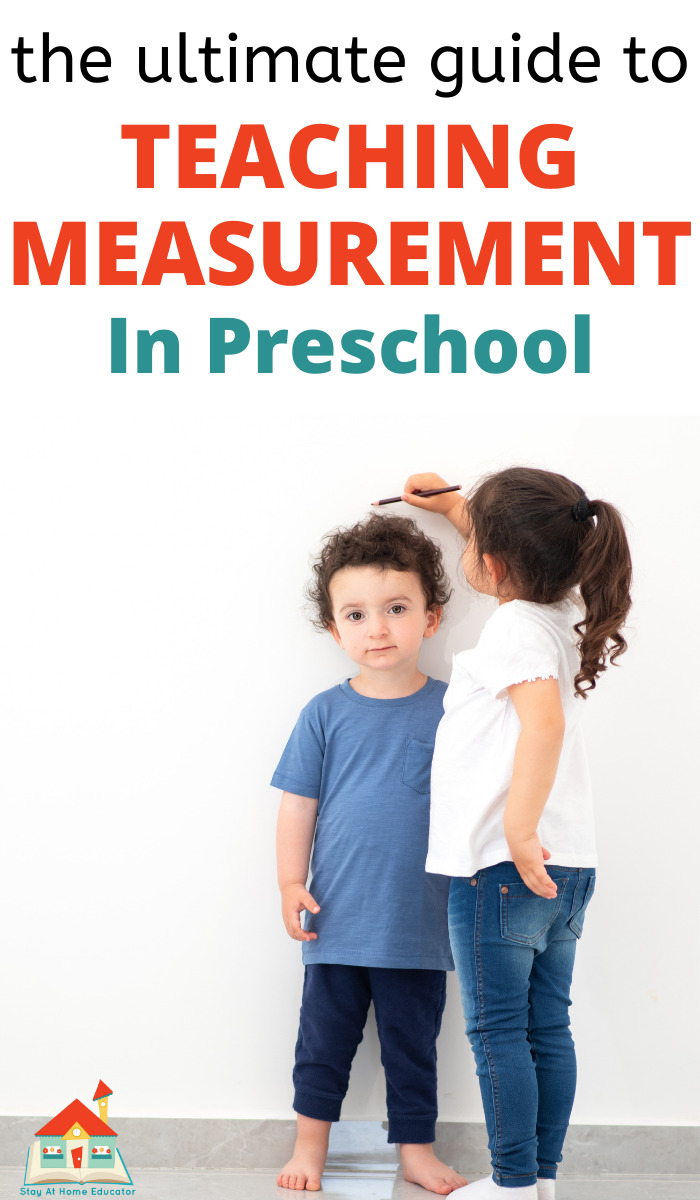
A robust preschool math curriculum will include instruction in all five disciplines of math. This includes teaching preschoolers within the measurement discipline, comparing weight, height, and length, and learning about all the ways we measure in our daily lives.
Teaching within the measurement math discipline takes intentional planning. During the preschool years, this typically focuses on comparing sizes and understanding measurable attributes. This is your ultimate guide to becoming a successful parent-teacher in teaching measurement to your preschooler, plus we’ve included great measurement activities.
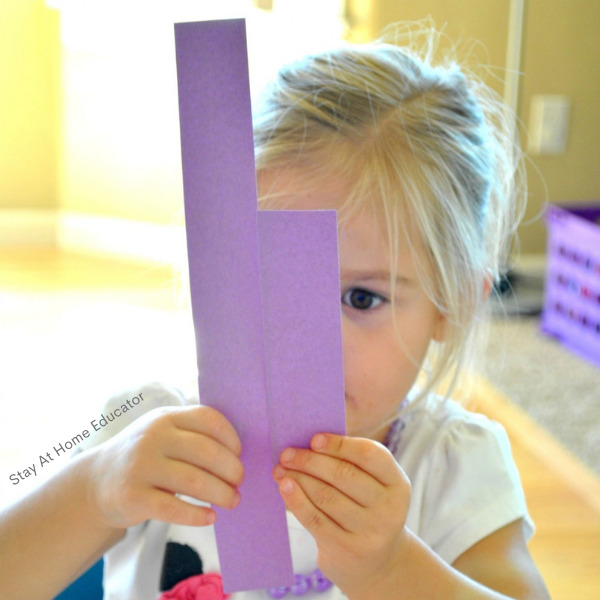
What is Measurement for Preschoolers?
Although measurement may seem advanced for preschoolers, young children are the first ones to measure fairness and equality when it centers around play. You might hear, “I want the bigger block!” Or perhaps, “She’s had the marker for too long and it’s my turn now!” These informal experiences prove that children understand measurement in its simplest form beginning at a young age. They’re already completing their own measurement activities for preschoolers!
In preschool, measurement skills include:
- measuring height, length, and weight in non-standard units
- recognizing quantities that are more and less
- identify most and least in quantities and volume
- identify big, medium, and small, as well as the terms bigger and smaller
- ordering up to 5 objects by size in both ascending and descending order
As with all the other strands of mathematics, the study of measurement provides a foundation for more advanced concepts of measurement that will be learned in the later years. Time, measuring with standard units, and learning to measure perimeter and area are all things that will be explored and learned in time.
Building measurement concepts in preschool will allow students to make real world connections in math.
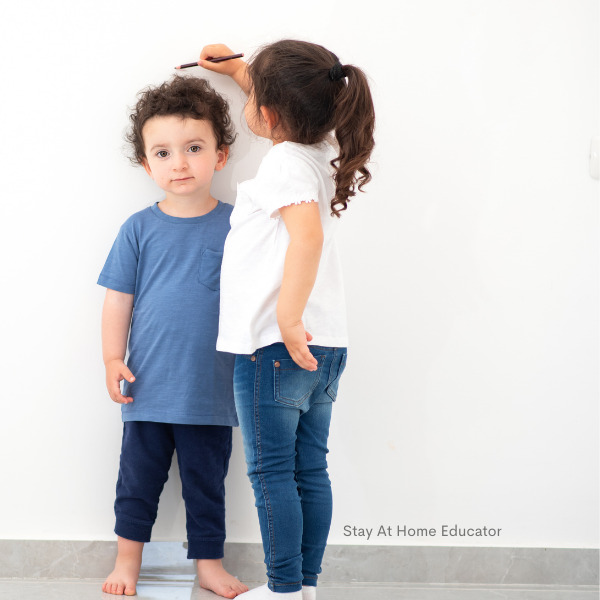
Why Learning to Measure is Important
In preschool, measurement activities relate to the ability to recognize and define the size or amount of something. These are typically established using non-standard units of measure, such using as blocks, unifix cubes, and counters to measure height. We also use our hands for measuring length and water to measure volume.
Children begin applying measurement ideas in their lives from a young age. Often without thinking about it, they compare the size of their toys, which grocery bag is lighter to carry, and how long they can make an animal parade.
Measurement relates to much more than just size. Children will eventually compare and order by size or weight, measure area, determine volume and capacity, tell time, and determine temperature. Providing ample opportunity for children to use math vocabulary to describe, compare, think critically, and observe allows them to develop measurement skills that will prepare them for the next level in their mathematics journey.
How do Preschoolers Develop Measurement Skills?
You may be wondering, how do I teach measurement to preschoolers?
Children naturally measure in their everyday lives. They note that their parent is taller than their own height, notice how full their cup of milk is, and observe the really long train by the road. They also have a beginning understanding of time and can note how two minutes is much faster than thirty minutes.
Measurement activities for kids in preschool are an introduction to identifying big, medium, and small, as well as the terms bigger and smaller. It also includes ordering up to 5 objects by size in both ascending and descending order.
Preschoolers should also learn measuring terms such as:
- longer
- shorter
- taller
- bigger
- smaller
- heavier
- lighter
Encourage children to use measurement words and vocabulary and solve problems through play.
Observing children throughout the day and asking intentional questions about measurement is an ideal way to build depth of understanding. You might hear children say things like:
- My car is longer.
- I’m taller than you.
- Your book box is heavier than mine.
- My hair is shorter than yours.
Offering preschoolers a variety of measuring tools and even some measurement task cards will help them naturally incorporate more measurement concepts into their play.
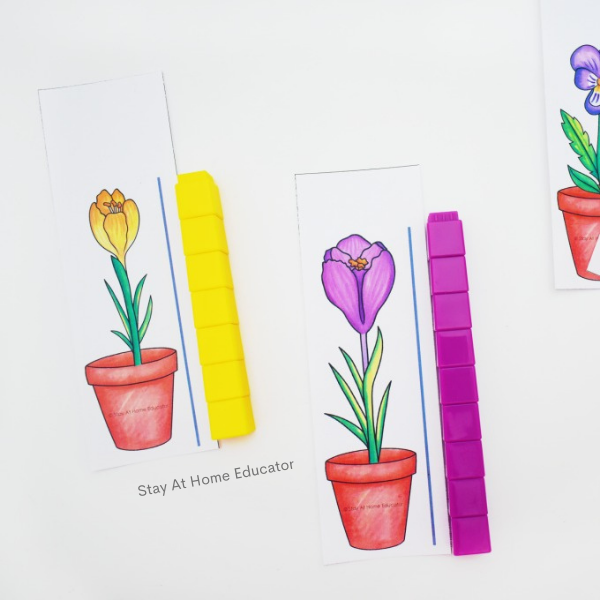
Why is Number Sense Important when Teaching Measurement?
Number sense is critical when teaching measurement because numbers are embedded in the concept of measurement. In measurement, we count by units, which is essentially the same thing we are doing when we count objects. Students need to have a conceptual understanding of how numbers work and make those connections as they measure.
Thoughtful prek measurement activities will provide more opportunities for preschoolers to make these connections.
What Are Some Tips for Teaching Measurement to Preschoolers?
Learning how to measure can be challenging for young children.
Children need to understand that in order to measure accurately, they’ll need to line up multiples of the same items (like crayons or cubes) so there aren’t any gaps. Plus, they have to learn that it is important to use the same unit of measurement for each task. For example, they can only use paperclips to measure the length of their shoe and not a mix of paperclips, crayons, and counting bears.
Fun Ways to Teach Measurement
- Provide authentic and real-life experience as often as possible.
- Encourage students to talk about math and explain how they measured, even if their answer is wrong. This helps develop mathematical thinking and questioning.
- Use engaging and interesting manipulatives for measurement, rather than pencils and paper.
- Ask leading questions when teaching.
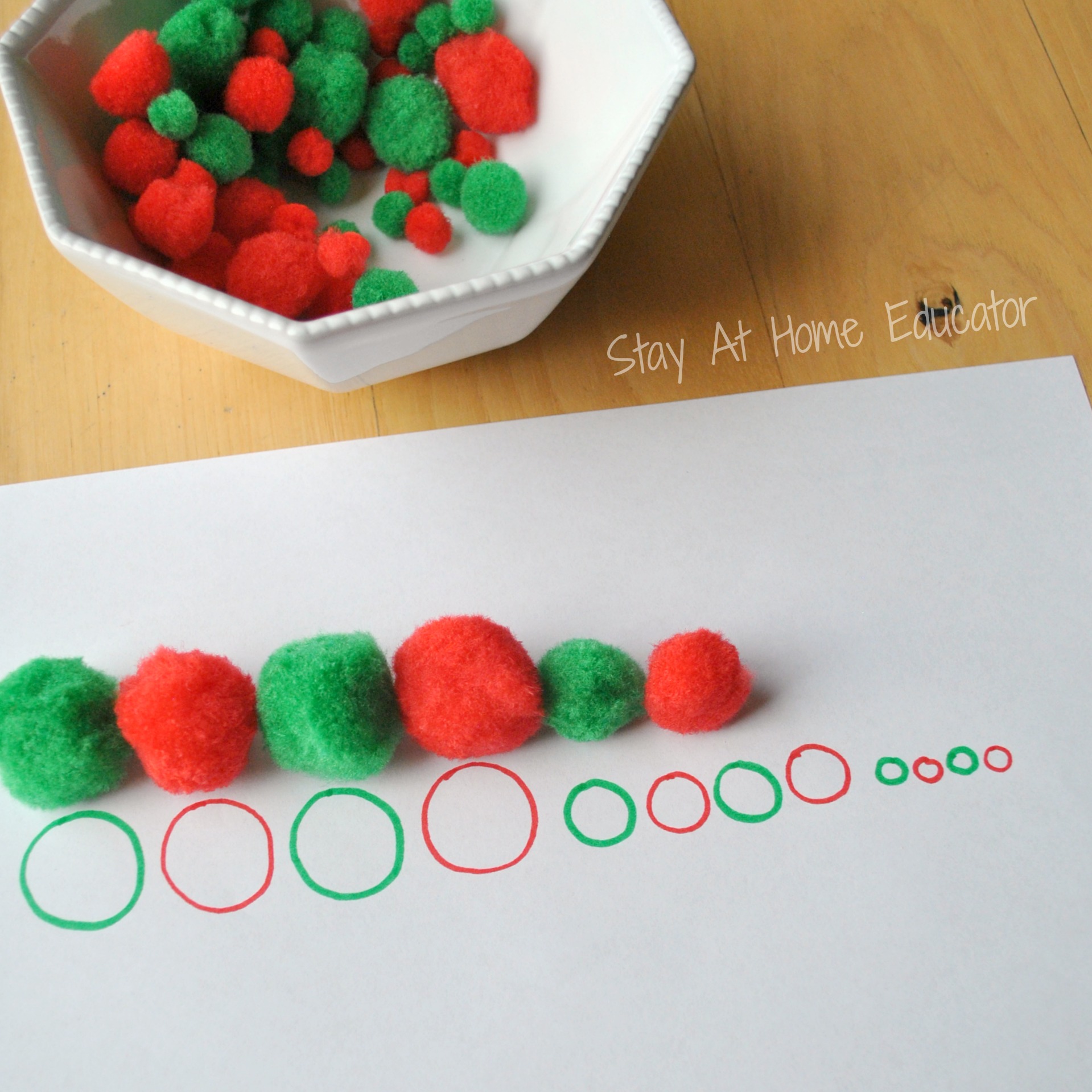
Teachers can help build on these concepts by asking questions such as:
- How do you know?
- Can you tell me more about that?
- What tools can we use to measure?
- What happens if you try that again? Is it the same?
- How can we compare?
All children are naturally curious about their environment and are constantly comparing things, even before they have the words to describe what they are comparing. You can help your child by using comparison words like bigger, smaller, longer, and taller. For example, My shoes are bigger than your shoes!
Use Picture Books!
Another amazing resource for teaching measurement to preschoolers is picture books! These age-appropriate books break down the large concepts of measuring into simple, relatable material. Here are some of our classroom favorites!
More Tips for Teaching Kids to Measure
- Have children measure the same object using different units.
- When they measure an object with paperclips, then Cheerios, then pencils, they’ll get different measurements. Prompt the child to explain why the measurements are different using different items to measure.
- Include conversations and opportunities to practice with time.
- Time is an abstract concept to young children who often mix up days with hours or months with years. For example, using a calendar regularly helps children understand how days, weeks, and months work. Set timers so children can begin to cement the knowledge of two minutes versus thirty minutes.
- Use a balance scale to measure weight and compare the weight differences between two objects.
- Encourage children to be their own balance scale and drop their hand low with the heavy object and bring their lighter object up high.
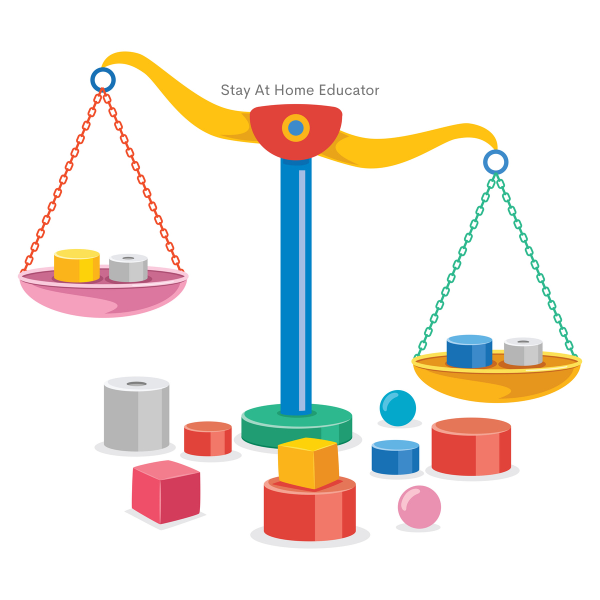
Measurement Manipulatives
Manipulatives can be very helpful when doing measurement activities with preschoolers! Here are some of the things we reach for regularly in our classroom.
Get the Daily Lessons in Measurement Preschool Unit
Remove any overwhelm from teaching measurement to preschoolers by following these easy, step-by-step measurement lesson plans. You’ll get four weeks of daily measurement lessons to do with your preschooler, plus bonus activities, teaching tips, literacy integration activities and even weekly printable preschool centers.
This unit is systematic, which means the skills progress in a way that is developmentally appropriate for preschoolers. And, everything is hands-on and fun!
Each day in the preschool measurement lesson plans includes review activities and new learning concepts about measurement. Concepts of measurement include discrimination and comparing and activities on measurement of length, height, and weight. Best of all, no special tools are required!
Free Measurement Activities for Preschoolers
The Secrets of Teaching Math to Preschoolers
Teaching math is an enormous task, and with the new changes in adopted state standards the bar for teachers has risen even higher.
That’s because there is a lot that goes into teaching math.
It’s comprehensive and systematic. And measurement is only one piece of the puzzle.
Mathematicians indicate there are five disciplines of math (like mentioned above) that should be taught, which are as follows:
- number sense – the development of a deep understanding of numbers and the number system, to compose and decompose numbers and understand their various relationships
- algebra – the understanding of patterns and relationships, including sorting and categorizing
- geometry – the understanding of spatial relationships, prepositional terms, and the properties of two and three-dimensional shapes
- measurement – the ability to make comparisons and order, understanding measurable attributes
- data analysis and probability – (you are here) understanding data as a means of sharing organized information and understanding that certain variables affect data
Get Daily Lessons in Preschool Mathematics
Remember how I said that teaching math to preschoolers is systematic? That means you can’t put the cart before the horse. When it comes to teaching math, the skills need to be taught at the right time and in the right order.
Make teaching preschool math easy with done-for-you Daily Lessons in the Preschool Mathematics Curriculum.
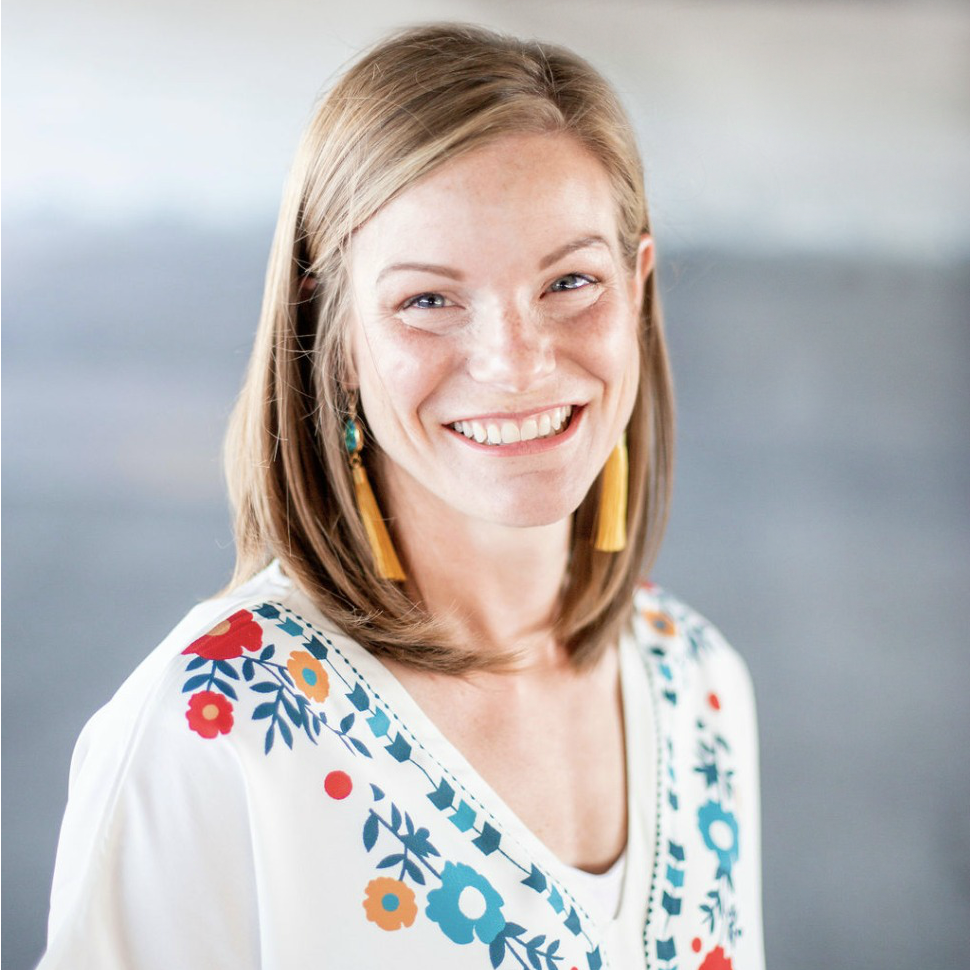
I’m Sarah, an educator turned stay-at-home-mama of five! I’m the owner and creator of Stay At Home Educator, a website about intentional teaching and purposeful learning in the early childhood years. I’ve taught a range of levels, from preschool to college and a little bit of everything in between. Right now my focus is teaching my children and running a preschool from my home. Credentials include: Bachelors in Art, Masters in Curriculum and Instruction.
